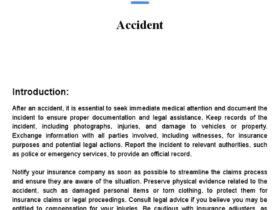Accident insurance is a financial safety net designed to protect you and your family from the unexpected costs associated with accidental injuries or death. In the United States, where accidents are a leading cause of injury and death, understanding accident insurance is crucial. This article will delve into the specifics of accident insurance, covering its benefits, costs, different types of coverage, and who might benefit most from having a policy in place.
What is Accident Insurance?
Accident insurance provides a payout to individuals who experience an injury or death resulting from an accident. This coverage typically includes compensation for various expenses, such as medical bills, lost income, dismemberment, loss of sight, and in the unfortunate event of death, benefits for your loved ones. It acts as a supplementary insurance, designed to work alongside your primary health insurance to cover costs that your main policy might not fully address. Yes, having an accident protection insurance in the US can certainly be a ‘life saver’ when having to deal with unforeseen expenses.
Core Coverage Benefits

Accident insurance policies often come with a range of core benefits. These benefits provide financial support during different phases of recovery and in various circumstances following an accident. Here’s a look at some common core coverage benefits:
- Broken Bones Cover: This provides a lump sum payment for each broken bone sustained in an accident. The amount can vary depending on the policy and the specific bone fractured.
- Hospital Stay Cover: If an accident requires a hospital stay, this benefit provides a daily or lump sum payment to help cover expenses incurred during hospitalization.
- Permanent Injury Protection: In the event of life-altering injuries such as paralysis, blindness, deafness, or loss of limbs, this coverage offers a significant payout, with the amount depending on the severity and the policy’s coverage limits.
- Total Permanent Disablement: Should an accident render you permanently unable to care for yourself, this benefit provides financial support.
- Accidental Death Cover: This benefit ensures your loved ones receive a lump sum payment in the event of your death due to an accident.
- Non-Accidental Death Cover: Some policies may even include coverage for death due to natural causes, often providing a refund of premiums paid or a gradually increasing payout over time.
Optional Coverage

Beyond the core benefits, many accident insurance policies offer optional add-ons to tailor coverage to your specific needs and lifestyle. Some common optional coverages include:
- Child Cover: This extends the policy’s benefits to cover children, including broken bones, hospitalization, and even specific illnesses like children’s cancer.
- Active Lifestyle: This covers injuries like ligament tears, tendon ruptures, and dislocations, often geared toward individuals who actively participate in sports and fitness activities.
- Healthcare Cover: This provides additional protection for those who may be at higher risk of contracting illnesses, such as those working in the healthcare sector.
Who Needs Accident Insurance?
![]()
While anyone can benefit from having accident insurance, it is particularly valuable for certain individuals and groups. Here are some examples:
- Individuals in High-Risk Occupations: Those working in construction, manufacturing, transportation, or other industries with a higher risk of accidents can greatly benefit from the added financial protection.
- Self-Employed Individuals: If you’re self-employed, an accident could result in a significant loss of income. Accident insurance can help cover business expenses and personal living costs during your recovery.
- Active Individuals: If you participate in sports or recreational activities with a risk of injury, accident insurance can help cover medical expenses and lost income if you’re sidelined by an accident.
- Families with Limited Savings: Accident insurance can provide a crucial financial safety net for families who may not have sufficient savings to cover unexpected medical bills and lost income due to an accident.
- Those with High-Deductible Health Plans: If your health insurance plan has a high deductible, accident insurance can help cover those out-of-pocket costs in the event of an accident.
Costs and Considerations

The cost of accident insurance varies depending on factors such as the level of coverage, the provider, and your individual risk profile. Premiums can range from affordable to more substantial depending on the chosen policy. It’s important to carefully consider your needs and budget when selecting a policy. Comparing quotes from different providers and consulting with a financial advisor can help you find the best coverage at a price you can afford.
It is crucial to remember that accident insurance is not a substitute for comprehensive health insurance. It’s designed to supplement your primary health coverage, not replace it. It’s also important to understand the policy’s exclusions and limitations before purchasing coverage.
Conclusion
Accident insurance offers valuable financial protection against the unexpected costs associated with accidents. By understanding the coverage, benefits, costs, and who it is most suitable for, you can make an informed decision about whether accident insurance is right for you and your family. Consulting with a financial advisor can help you assess your needs and find the best policy to provide peace of mind in the face of unforeseen accidents.





Leave a Reply